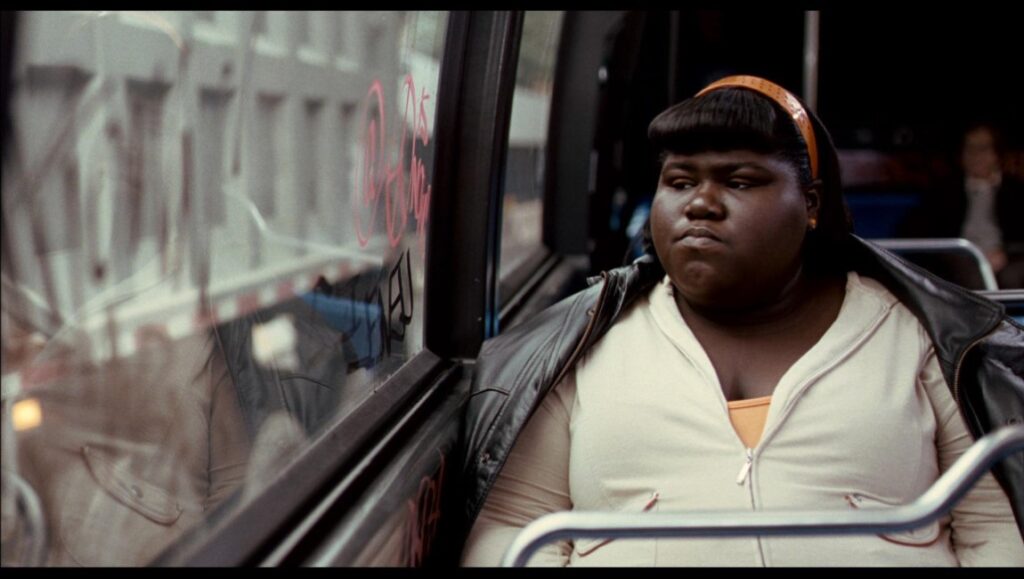You think your life is hard? Sure, we all have problems, but Precious has it worse than most of us. An illiterate Harlem teenager with one down-syndrome child and another baby on the way, Precious deals with more issues before the age of eighteen than many of us will face in a lifetime. Directed by Lee Daniels, Precious has received lots of positive attention over the last year. Can you say Oprah? It won the Grand Jury Award for Drama and the Audience Award at Sundance 2009 and is turning up on lots of year-end best of lists. The performances are strong, the filmmaking has verve and the story infuses just enough feel-goodery to give audiences an uplifting experience (despite the profoundly downer content). But, is this a great film? No. The movie meanders from scene to scene without a steady narrative drive and relies too heavily on built-in empathy for the main character without pushing the story to explore the real emotional truth underneath the shocking onscreen actions.
Set in 1987 Harlem, Precious focuses on the disturbing day-to-day reality of Clareece “Precious” Jones (Gabourey Sidibe), an obese sixteen-year-old still in Junior High school. After becoming pregnant for the second time the school district expels her, and she ends up at an alternative high school. Once there, she meets a lovely teacher with a heart of gold and a colorful, charming group of girl friends with varying issues. This might sound inspiring, but we haven’t talked about life at home yet. Precious’ family makes the clan in the Texas Chain Saw Massacre look like the Waltons. Mother Mary, played by comedian Mo’Nique, is one of the most disturbing villains I’ve seen on film. Physically and verbally abusive every second of the day, Mary is mad at the world and Precious gets the brunt of her anger. But it gets worse. Precious’ father, whose face we never see, has been sexually abusing the young girl for years and is the father of her two children. This is heavy, unpleasant stuff.
Director Daniels shoots the action in an intimate handheld style that gets us right into the middle of every room. And there are moments when the action gets so intense you’ll wish you weren’t there. Daniels knows that there are moments when Precious, too, needs to escape. So he creates a series of fantasy sequences that represent the dream-life of this beaten down young person. These simple scenes feature Precious wandering down a red carpet dressed in sequined gowns with a handsome young man on her arm as cameras flash. This is how she escapes. It’s a bit of relief for the audience as well, since soon enough we’re back in the harsh world of extreme family dysfunction. Thankfully, the film doesn’t offer easy answers to the problems it raises. If big budget Hollywood had made this film, you can guess that Precious would end up living with a rich white family or being elected president of the student body. Unfortunately, in an effort to not provide easy solutions, the filmmaker creates a work with no meaningful point of view. It presents us with horrible situations and then steps away. This filmmaking choice leaves the viewer unsatisfied. For much of the film you wondered: what is Precious thinking? Because she barely talks, she basically becomes a “symbol” of an innocent victim caught in this vicious storm of urban insanity. It’s probably realistic that Precious wouldn’t say much. However, in this case the filmmakers’ commitment gets in the way of engaging, effective storytelling. It doesn’t lead to emotional resonance, just sad feelings.
Despite the lack of a coherent whole, the film does have several high points. The girls who make up Precious’ alternative school classmates are consistently funny, surprisingly real. Scenes of them talking and learning are engaging and lively. These girls offer a palatable energy that is missing in the rest of the film. In addition, supporting appearances by Mariah Carey and Lenny Kravitz are strong and unexpected. They perfectly blend in with the film and offer unique takes on standard-issue roles. Daniels’ filmmaking can be a bit all over the map, but when he settles down, he does create a nice mix of brutal realism and stylized flourish to represent the inner and outer life of this young woman cast aside by society. But when anyone talks about this movie they will have to talk about the performance of Mo’Nique, who blows the roof off the joint. She inhabits the character so fully that it’s hard to imagine the woman who plays this role is a functioning member of society. Daniels deserves credit for focusing his camera on characters and situations that we don’t normally see on screen. Precious includes all of the necessary ingredients for a dark, unsettling urban expose, but relies on the superficial trappings of these situations rather than real human truths to convey the emotion of this story.


Comments are closed.